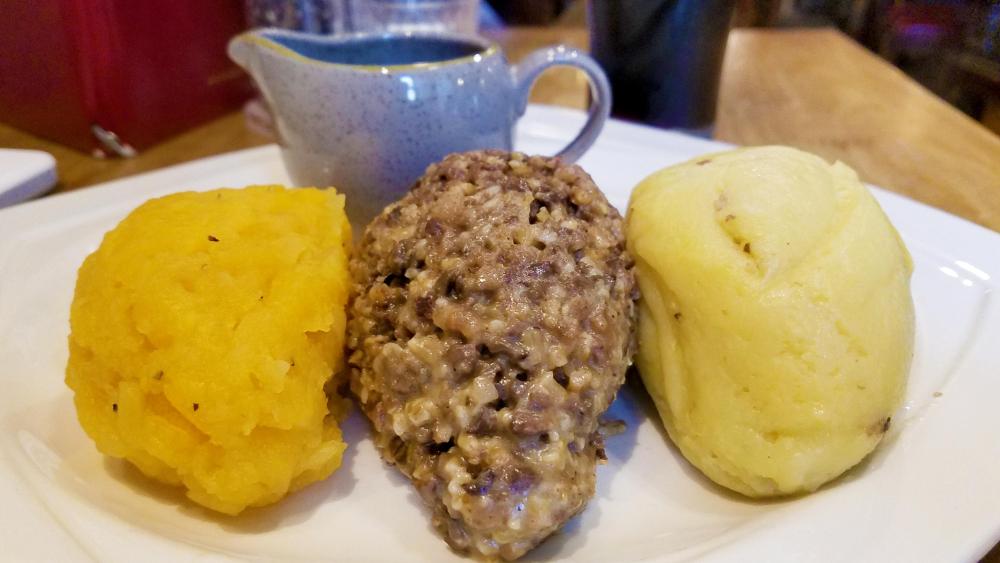I’m posting this now to give you time to prepare for the celebrations.
Haggis is normally associated with Scotland but while it is popular there, there is no evidence that it originated there. The Romans had similar preparation and may have introduced it during their brief occupancy of northern Britain. Also, there are similar dishes recorded in the early 19th century in England.
This is hardly surprising. Haggis was one answer to how to preserve slaughtered animals as long as possible. The most perishable parts were the offal. So by salting and cooking, it lasted longer. The same idea was employed in the preparation of blood sausages, also still popular in Scotland as ‘black pudding’.
Basically and traditionally, haggis is the minced lungs, liver and heart of a sheep with added minced fat, onions, oatmeal and spicing, all mixed and boiled after being sewn into the animal’s stomach. Vegetarian versions also exist. Never mind.
The prepared haggis is boiled for around two to three hours depending on size. This causes the oatmeal to swell and unless care is taken the thing can explode from the pressure. It is normal to prick the stomach with a needle after some cooking to allow some release.
The poet, Robert Burns (Auld Lang Syne and Red, Red Rose among many others) lauded the haggis as the ‘great chieftain o’ the pudding race’ in his To a Haggis and today is remembered around the world on his birthday, 25th January, by holding celebratory Burn’s suppers where the haggis is served with mashed ‘neeps’ (swedes), mashed potatoes and washed down with a copious amount of whisky. The poem is normally recited at such events as the dish is served.
English and other visitors are often advised to be on the lookout for wild haggises when they venture into the hills and mountains. The creature has shorter legs on one side of its body, enabling it to run around the slopes more quickly, making it very difficult to catch. So when you eat it, you should be appreciative of the skilled hunting that enabled your meal. People fall for it.
I have no time for people who just say it’s disgusting, never having tried it. Say you don't want to try it – OK. Your loss. If you are on the fence, try it. You’ll probably be pleasantly surprised.
To A Haggis - Robert Burns 1786
Fair fa' your honest, sonsie face,
Great chieftain o the puddin'-race!
Aboon them a' ye tak your place,
Painch, tripe, or thairm:
Weel are ye wordy o' a grace
As lang's my arm.
The groaning trencher there ye fill,
Your hurdies like a distant hill,
Your pin wad help to mend a mill
In time o need,
While thro your pores the dews distil
Like amber bead.
His knife see rustic Labour dight,
An cut you up wi ready slight,
Trenching your gushing entrails bright,
Like onie ditch;
And then, O what a glorious sight,
Warm-reekin, rich!
Then, horn for horn, they stretch an strive:
Deil tak the hindmost, on they drive,
Till a' their weel-swall'd kytes belyve
Are bent like drums;
The auld Guidman, maist like to rive,
'Bethankit' hums.
Is there that owre his French ragout,
Or olio that wad staw a sow,
Or fricassee wad mak her spew
Wi perfect scunner,
Looks down wi sneering, scornfu view
On sic a dinner?
Poor devil! see him owre his trash,
As feckless as a wither'd rash,
His spindle shank a guid whip-lash,
His nieve a nit;
Thro bloody flood or field to dash,
O how unfit!
But mark the Rustic, haggis-fed,
The trembling earth resounds his tread,
Clap in his walie nieve a blade,
He'll make it whissle;
An legs an arms, an heads will sned,
Like taps o thrissle.
Ye Pow'rs, wha mak mankind your care,
And dish them out their bill o fare,
Auld Scotland wants nae skinking ware
That jaups in luggies:
But, if ye wish her gratefu prayer,
Gie her a Haggis
translations of varying exactitude are available online.



